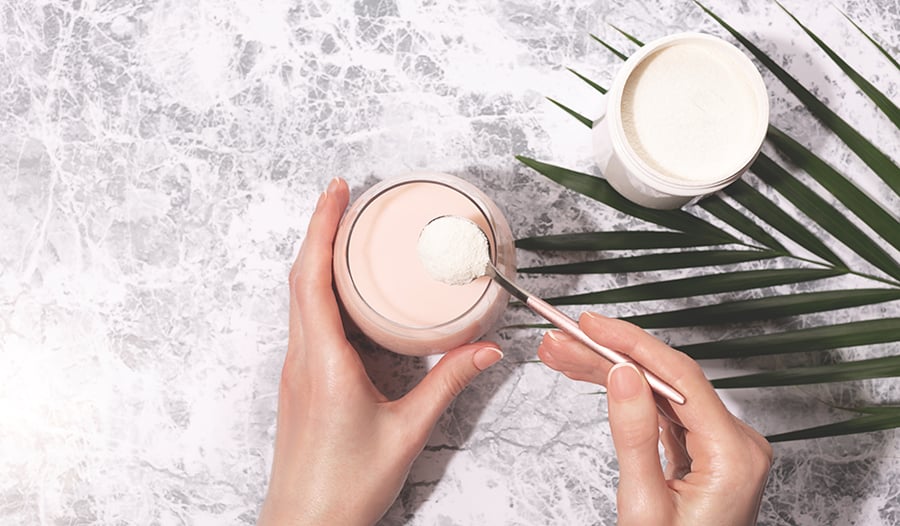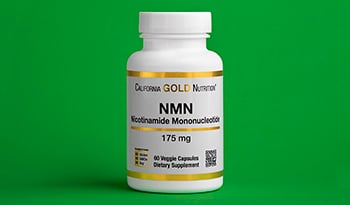Kolagen: Rodzaje, Korzyści, + Wskazówki

Czym jest kolagen?
Kolagen jest najobficiej występującą formą białka w twoim organizmie. Jest podstawowym budulcem kości, skóry, mięśni, ścięgien, więzadeł i innych tkanek łącznych, zapewniając siłę i wsparcie w całym ciele. Dzięki zdrowej diecie twoje ciało może budować kolagen z aminokwasów znajdujących się w białkach wraz z witaminą C, cynku, miedzi i manganu. Jednak wraz z wiekiem istniejący kolagen rozkłada się szybciej niż może zostać odbudowany przez organizm.
Jakie są różne rodzaje kolagenu?
Przy 28 różnych typach kolagenu, określenie, który suplement należy przyjmować, może stać się przytłaczające. Spójrzmy na pierwszą trójkę.
- Kolagen typu I stanowi 90% kolagenu i znajduje się w Twoim ciele od stóp do głów. Tak więc, gdy rozważasz jakikolwiek suplement, kolagen typu I powinien być częścią formuły, aby zapewnić bardziej ogólne wsparcie.
- Kolagen typu II jest często spotykany w suplementach wspierających zdrowie stawów, ponieważ występuje głównie w chrząstce.
- Kolagen typu III występuje głównie w mięśniach, tętnicach i narządach.
- Pozostałe 25 typów kolagenu są ważne dla innych obszarów ciała, ale są wymagane tylko w mniejszych ilościach. Jeśli się nad tym zastanowić, 90% twojego kolagenu to typ I, co oznacza, że pozostałe 10% jest podzielone między pozostałe 27 typów.
Jak możesz zwiększyć ilość kolagenu w organizmie?
Oczywiście dobrze zbilansowana dieta, w tym wysokiej jakości białko (dostarczające budulca dla kolagenu), dużo ruchu i snu, nie palenie, noszenie kremów z filtrem przeciwsłonecznym (aby chronić kolagen Twojej skóry przed rozkładem przez promienie UVB/UVA) są częścią wspierania produkcji kolagenu w organizmie.
Ponadto dostępne są suplementy kolagenowe. Należy jednak pamiętać, że suplementy te powinny zawierać kolagen w formie "peptydowej", co oznacza, że cząsteczka kolagenu została rozbita na mniejszą formę. Cała forma cząsteczki kolagenu nie może zostać wchłonięta.
Czego szukać w składnikach suplementów kolagenowych?
Biorąc pod uwagę przytłaczającą liczbę opcji w kategorii suplementów kolagenowych, ważne jest, aby wiedzieć, czego szukać w odniesieniu do składników.
Poszukaj suplementu kolagenowego, który zawiera klinicznie przebadane składniki, takie jak witamina C , witamina A , witamina A i biotyna dla uzyskania optymalnych rezultatów. Witamina C może pomóc w ochronie skóry i pomaga w tworzeniu kolagenu w warstwie skóry właściwej, a witamina A pomaga w odnowie skóry w warstwie naskórka. Biotyna wspiera zdrową skórę, włosy i paznokcie.
Referencje:
- https://my.clevelandclinic.org/health/articles/23089-collagen
- https://nutritionsource.hsph.harvard.edu/collagen/
- Hunt, N. C. (2010). Alginianowa matryca hydrożelowa do miejscowego dostarczania ko-kultury fibroblastów i keratynocytów w celu przyspieszenia gojenia się ran. https://core.ac.uk/download/75539.pdf
WYŁĄCZENIE ODPOWIEDZIALNOŚCI:Celem niniejszej Strefy Zdrowia nie jest stawianie diagnoz...

















































































 Spis treści
Spis treści















